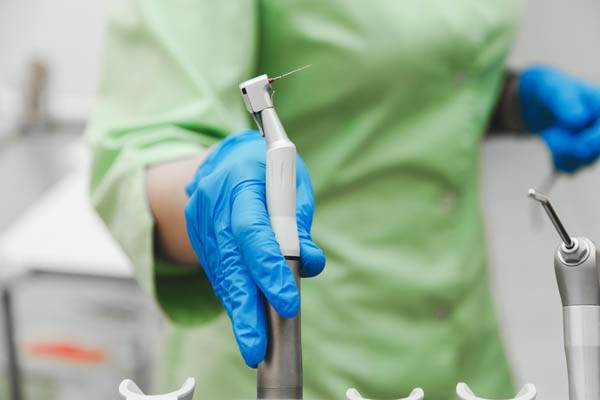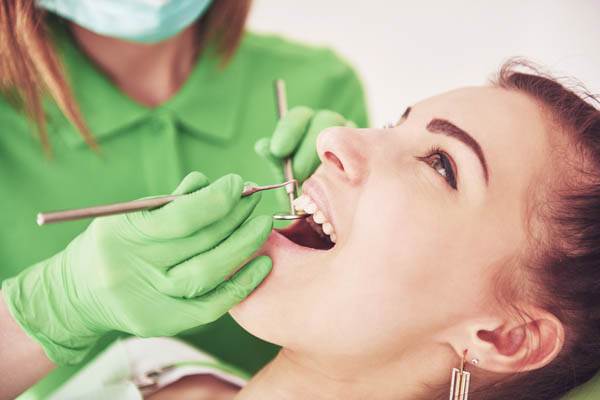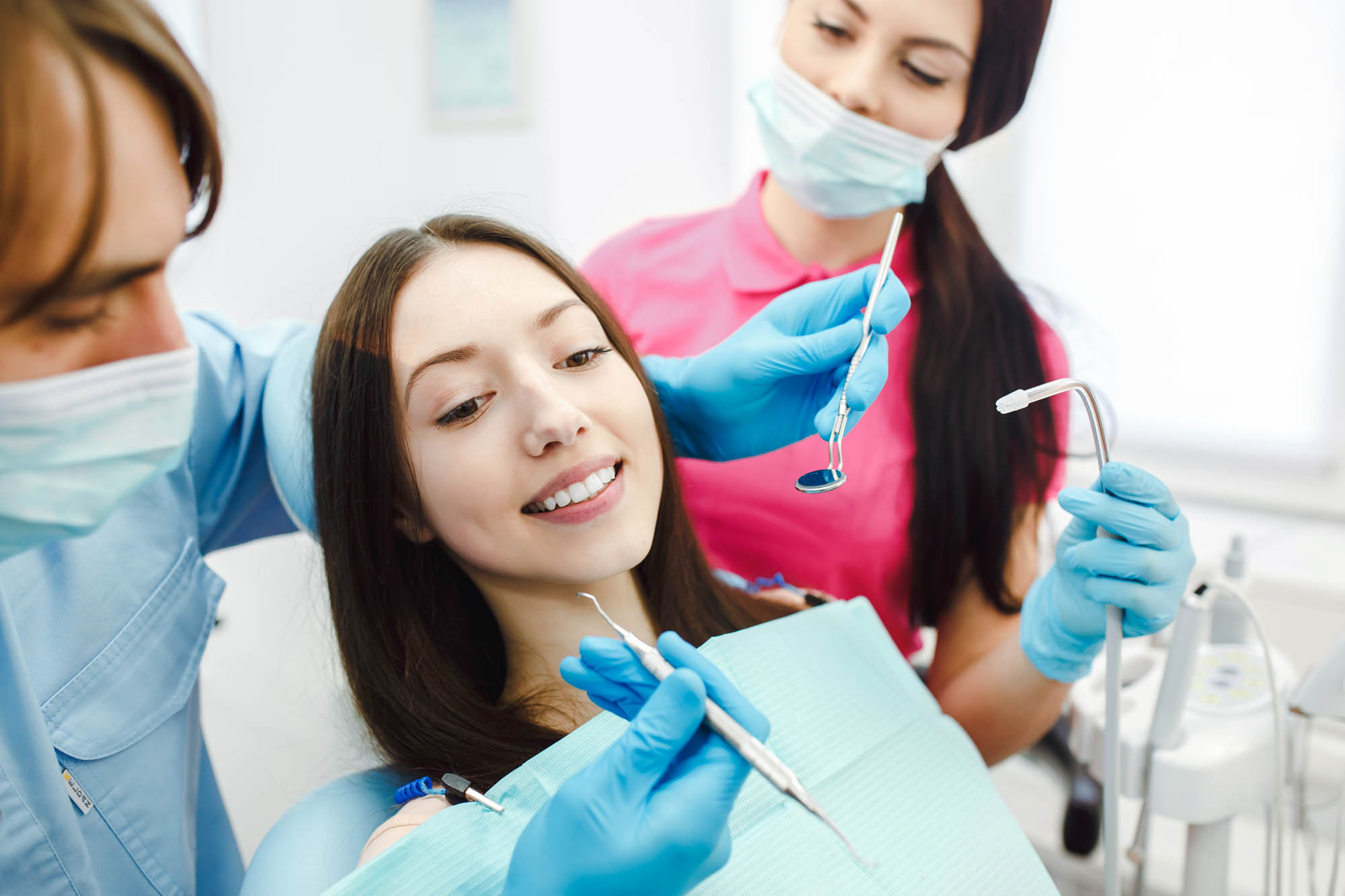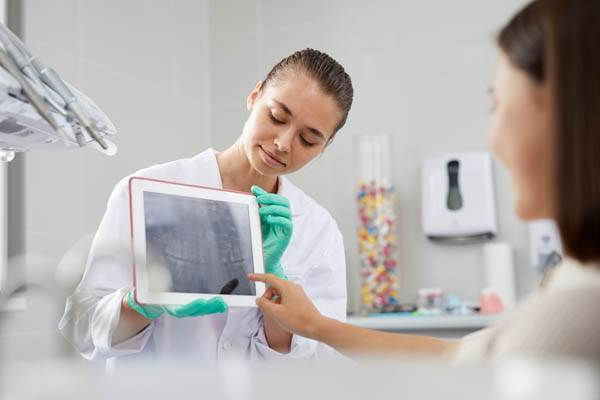Dental Hygienist visit
Professional teeth cleaning and polishing to prevent buildup of plaque and tartar on the tooth surfaces.
What is a dental hygienist visit?
A dental hygienist is a professional with specialized skills in preventive dental care. Along with preventive treatments on the teeth, the hygienist will also demonstrate correct brushing and flossing methods and counsel you on the significance of a nutritious diet on your oral health.
What does a hygienist do to your teeth?
Evaluate the overall tooth and gum health.
Remove hard deposits and plaque from the tooth and root surfaces.
Apply sealant on the tooth grooves to protect against decay.
Provide topical fluoride treatment when appropriate.
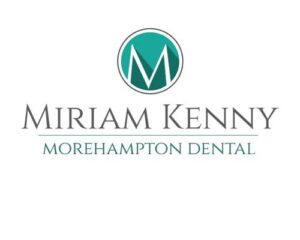

Yes, visiting your hygienist every six months is important for the maintenance of good oral health. Most people need a little help to achieve a good toothbrushing technique and also to incorporate a system of cleaning between their teeth. The hygienist will evaluate your hygiene practices and advise any modifications as necessary.
It is also impossible to identify early decay or gum disease by yourself at home, so you will require a professional’s expertise in detecting early disease.
Gums that bleed on brushing are a common sign of early gum disease. If you suffer from bleeding gums, your dentist may recommend a dental scaling and root planning treatment. Scaling is a non-invasive, non-surgical method of treating gum disease by removing the calculus (hard deposits) and plaque (soft deposits) on your teeth.
When correct brushing techniques are not followed, over time, plaque and calculus collect along and below your gum line. The deposit causes the attached gums to pull away from the teeth and form deep tooth pockets, where more deposits collect. The deposits also house dangerous bacteria that, if left to fester, infiltrate your gums and cause infections. The infection damages the gum and bone tissues, destroying the tooth’s attachment apparatus in the mouth. In this late gum disease stage, your teeth will start to become loose and eventually fall out if not treated. Scaling and root planning removes these deposits as regular brushing cannot remove them.
Special scaling and root planing instruments are used to remove the deposits and make the surfaces free of bacteria. The tools can access the hard-to-reach areas of the tooth, specifically below the gum line. Our hygienists may use either hand instruments or ultrasonic tips attached to a specialised ultrasonic machine. Sometimes, the scaling procedure can be uncomfortable for patients, so your hygienist will give you anaesthesia to make the process more comfortable.
Happy Patients
We always strive to ensure that all our patients leave us smiling
Miriam Kenny truly is an exceptional dentist. Passionate about her work, honest in her assessment and faultless during procedure. Miriam goes above and beyond to ensure a smooth experience for all patients. The whole team are fantastic and I would highly recommend this practice.
September 28, 2018
Dental HYGIENIST procedure
What to expect at a dental hygienist visit?
The first thing our hygienist will discuss with you as soon as you sit on the dental chair is your medical and dental history. This gives the hygienist an idea of your overall health and any red flags they may need to pay attention to.
For most hygiene visits the hygienist will do one round of teeth cleaning (also called scaling or oral prophylaxis) to remove any hard deposits or plaque accumulated on the teeth.
Removal of hard deposits is vital, as these become breeding grounds for dangerous bacteria and worsen gum health, leading to severe gum disease.
If you have many deposits, we will recall you for another appointment and perform deep scaling under local anaesthesia. This will ensure that the root surfaces are cleaned properly.
After the scaling, we will remove any stains and discolourations present on the teeth. Stains from tobacco, tea, coffee, wine and other foods are common and can give an unappealing look to your teeth.
Finally, we will polish the teeth with a polishing paste and rotating wheel to get a smooth surface.
Are dental hygienist visits important?
Along with dental checkups, regular hygienist visits are strongly encouraged. Our expert dental hygienists will clean your teeth using a unique ultrasonic instrument and remove the plaque and stains present on them. A build-up of plaque on the teeth results in calculus/tartar formation and is impossible to remove with regular brushing. Bacteria present in the plaque and calculus affect the gums’ health, causing an inflammatory reaction, involving the bone, destroying it and ultimately leading to loosening of the tooth. For this reason, it is vital that scaling or tooth cleaning be done every six months in patients who easily build up calculus, more frequently for those patients who have had a history of being susceptible to gum disease.
- Need Assistance?
Practice Plan
frequently Asked Questions
A visit to the dental hygienist will take about 20-30 minutes.
Most people brush their teeth using up and down or side-to-side motions. This brushing method is incorrect and can harm your teeth. Instead, you should brush with circular motions. Slant your tooth at a 45-degree angle against your teeth, with the bristles facing the gum line. Move your toothbrush back and forth 2-3 times under the bristles and then roll and sweep away from the gums to remove food debris and bacteria.
A dental hygienist specializes in preventative dental care. It is their job to halt your dental problems in their tracks and prevent their progress. Sometimes they can recognize and treat dental issues before they even start, When you go for a hygienist visit, they will deep clean your teeth and gums, removing any hard calculus or plaque buildup on the teeth surfaces. The hygienist will also remove stains and discolourations on your teeth, giving you a brighter smile in no time. Other dental issues like decay, gum and tooth infections and broken fillings can be detected early with timely hygienist visits.
Yes, a hygienist can remove surface stains and some discolourations on the teeth. During deep teeth cleaning, the hygienist uses ultrasonic instruments to scrape away the discoloured calculus or tartar on the tooth and root surfaces. They will also polish your teeth to make them shine. However, if the staining is internal, you may need to get intrinsic teeth whitening treatment to get rid of it. Sometimes, staining can be because of the presence of a cavity, in which case the hygienist bringing it to the attention of the dentist.
Miriam Kenny Morehampton Dental Practice
Your Trusted Dental Clinic
- About Us
- COVID-19 Prepared
- Why Choose Us
Our practice is based on providing a high standard of modern dentistry in a friendly, professional manner. It is our mission to help our patients maintain their teeth and a healthy mouth for their lifetime.
Our entire team is committed to this ideal. As a result, a high percentage of our business is from returning patients and referrals of their family and friends. We welcome and are grateful for these referrals.

With the current Covid-19 pandemic we are paying particular attention to our normal cross-infection practices, but in addition, we are keeping the practice well ventilated (it may feel cold) and we use a special Fogging machine with Hypochlorous acid (HOCL) which is an all-natural antimicrobial agent made from salt and water by an electrolysis unit. Fogging of each surgery is carried out between patients after any treatment involving an aerosol.
To reduce aerosol production during procedures with the dentist we most often use a little device called a rubber dam —.50 this isolates the immediate teeth we are working with & protects the back of mouth. During hygienist treatment we are using an extra suction device outside of the mouth, this also reduces aerosol production.
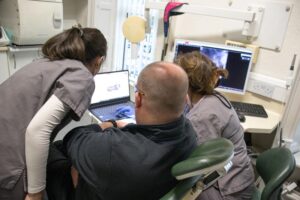
The practice is owned & directed by Miriam Kenny and as the business owner and the principal healthcare professional, I am primarily interested in providing evidence-based dental healthcare. This means my priority is to help my dental patients to maintain their own natural teeth in a healthy mouth for their lifetime.
We can help improve your smile – we offer a range of options depending on what is most appropriate for you, from tooth whitening to composite bonding to ceramic veneers, crowns and bridges.

How Much do Dental hygienist Visit cost?
At Miriam Kenny Morehampton Dental Practice we aim to provide state of the art, quality affordable dental treatment to all.
It was with this in mind that we created our affordable dental plans, which helps us to keep your teeth, gums and oral health in tip-top shape.
With our Practice Plan, you will attend every 6 months with the hygienist and once yearly for your dental examination and have no fees to pay at these visits. The cost of these visits is covered by your monthly subscription – this is as low as €14.50 or €21, depending on whether you qualify for the “PRSI” benefit.
| Treatment | Member of maintenance plan | Non-member of plan |
|---|---|---|
| Examination | Included in plan | €70 |
| Hygienist Visit | Included in plan | €90 |
| Small X-ray | Included in plan | €45 |
| Large X-ray (OPG) | €60 | €60 |
Other Treatments you may consider
Regular dental check-ups are essential for the early diagnosis and treatment of oral diseases.
Large cavities, tooth fractures/cracks, and bacterial entry under old restorations/fillings all call for a root canal treatment to save the tooth from being extracted.
Severe tooth pain, injury to the face and/or mouth, a cracked tooth, a fallen out tooth, a tooth abscess or uncontrollable bleeding from the mouth; these are all dental emergencies that need to be taken care of at the earliest.

